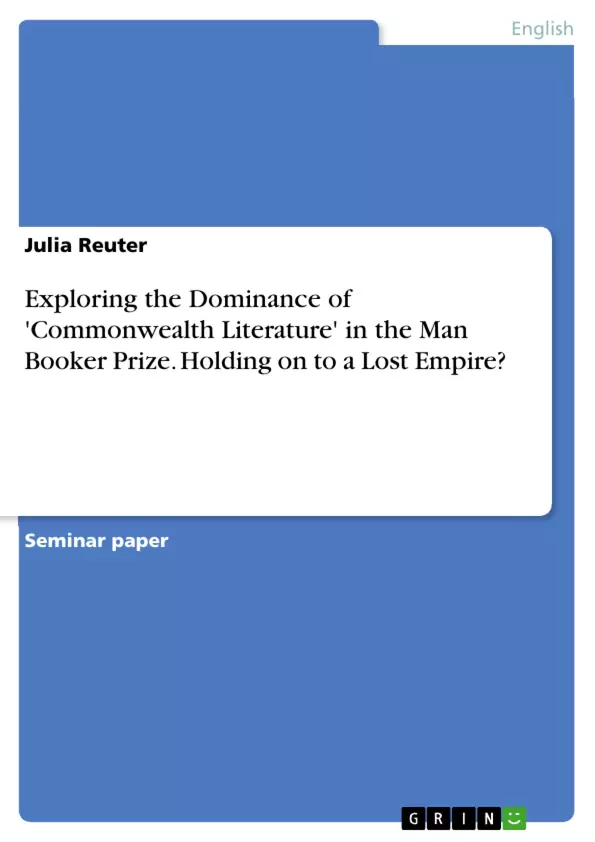This paper delves into the intriguing trend observed since the inception of the Man Booker Prize in 1969, where nearly half of the winners have hailed from the former colonies, a phenomenon unique among prestigious literary awards. Notably, the trend persisted beyond 2007, with works like "The White Tiger" from India winning in 2008. This study compares the Booker Prize with other literary honours, examining its exceptional public profile and influence.
The primary questions addressed include: Why do novels by citizens of former colonies or minority communities in Britain thrive in the United Kingdom? How can we categorize these works, and do they authentically portray former colonies and multicultural Britain? The paper aims to elucidate the role of 'Commonwealth literature' in the Booker Prize, investigating the meaning of this term and exploring alternative categorizations.
Chapter two provides a concise history of the Man Booker Prize and its remarkable success. Chapter three delves into the definition of 'Commonwealth literature' and explores more precise terms for the novels under consideration. Lastly, Chapter four conducts an analysis to unveil the factors contributing to the prominence of these novels in the Booker Prize. The paper concludes with an overview of key findings, shedding light on the unique relationship between the Booker Prize and literature from the Commonwealth.
Inhaltsverzeichnis (Table of Contents)
- Introduction
- The Success Story of the Man Booker Prize
- What is 'Commonwealth Literature'?
- Why is 'Commonwealth Literature' So Popular?
- Nostalgia for Empire
- Exoticism
- Education?
- Conclusion
Zielsetzung und Themenschwerpunkte (Objectives and Key Themes)
This paper aims to explore the role of "Commonwealth literature" in the prestigious Man Booker Prize. It analyzes the prize's history, its exceptional success, and attempts to define the term "Commonwealth literature." The paper further examines the reasons behind the popularity of these novels, particularly focusing on the relationship between Britain and its former colonies.
- The history and significance of the Man Booker Prize
- The definition and meaning of "Commonwealth literature"
- The popularity and impact of "Commonwealth literature" in the Booker Prize
- The changing relationship between Britain and its former colonies
- The role of postcolonial and post-imperial perspectives in contemporary literature
Zusammenfassung der Kapitel (Chapter Summaries)
- Introduction: This chapter introduces the topic by highlighting the significant presence of writers from former colonies in the Man Booker Prize. It raises questions about the popularity of these novels and their portrayal of former colonies and multicultural Britain.
- The Success Story of the Man Booker Prize: This chapter provides an overview of the history and evolution of the Man Booker Prize, emphasizing its impact and influence in both the literary and commercial spheres. It discusses the prize's sponsorship, eligibility rules, and the media attention it receives.
- What is 'Commonwealth Literature'?: This chapter critically examines the term "Commonwealth literature" and its limitations, exploring alternative perspectives from Salman Rushdie and Luke Strongman. It discusses the evolving nature of the relationship between Britain and its former colonies and the challenges of defining a specific literary category.
- Why is 'Commonwealth Literature' So Popular?: This chapter delves into the reasons behind the prominence of "Commonwealth literature" in the Booker Prize. It explores potential factors such as nostalgia for empire, exoticism, and educational value, highlighting the complex relationship between literature, cultural identity, and historical context.
Schlüsselwörter (Keywords)
The main keywords and focus topics of this text include the Man Booker Prize, Commonwealth literature, postcolonialism, post-imperialism, multiculturalism, British literature, former colonies, identity, and representation. The text examines the relationship between these concepts and their influence on contemporary literary trends and the role of literature in shaping perceptions of history and culture.
- Quote paper
- Julia Reuter (Author), 2010, Exploring the Dominance of 'Commonwealth Literature' in the Man Booker Prize. Holding on to a Lost Empire?, Munich, GRIN Verlag, https://www.grin.com/document/1416296



